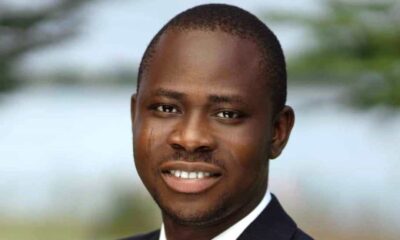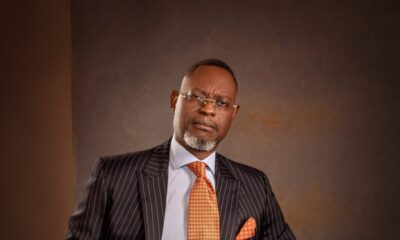GRPolitics
AbdulRahman AbdulRazaq sworn in as New Governor of Kwara State


BY: Justice Godfry
AbdulRahman AbdulRazaq has been sworn-in as the new governor of Kwara state at the council chambers, Kwara State Government House.
Here is his inaugural speech:
In the history of a people, a time comes when they individually and collectively decide to take their destiny in their own hands and fashion an alternative narrative and quest for peace, progress, growth and development for themselves and
future generations. Kwarans reached that decision-making point when they collectively decided to vote us into office on March 9, 2019.
Allow me to thank Allah for keeping us alive and in good health to see this historic day and thank you Kwarans for the confidence you have reposed in us in the course of our struggle to redefine, refocus and reposition our State. Let me also acknowledge my Party, the All Progressives Congress (APC)- its officials and field workers at all levels, for their support and hard work.
As you know, our victory, is only the beginning of our collective vision for a better Kwara.
I cannot so easily forget how the collective will, courage and determination of our people, irrespective of class or religion initiated, nurtured and propelled the Otoge movement that was the foundation, soul and spirit of our victory at the polls. You all fought against all odds and at great cost. Many of you were blackmailed, abused, humiliated and harassed in several ways because you simply said enough is enough.
It is my prayers that Allah will never forget you and will give you the strength to enjoy our victory. I believe we all know that the Otoge movement and victory does not belong to any single person. It belongs to the people of Kwara. The spirit of that movement shall always remain with us as we work to achieve our dreams.
If Otoge got us through the struggle to the point of victory, and given the enormous task of reformation and reconstruction ahead, it is now time for Iseya. As you will all agree, there is so much to be done. These range from institutional reforms and reconstruction, infrastructural development, human capacity building, social welfare and policy reforms to other socio-economic, cultural, scientific and administrative repositionings. It is not in our tradition to shy away from challenges. We shall engage them and find solutions.
We all know about the now legendary infrastructure deficits, decay and deprivations that our people have endured in the past 16 years. Now that we have put our hands on the wheel of peace, progress and sustainable development, we must redouble our efforts and show to the world that we know the difference between progress and stagnation.
Let me state that our goal in Office is not to lament over the sad past. Rather, our goal is to build confidence that a better future is possible; create an enabling environment to empower our people and communities.
Based on data from the research we have been conducting on the resource base of our State, there is no doubt that we are abundantly blessed in human and material resources. I make bold to say that there is enough wealth and opportunities for everyone in this state.
What we have lacked before now are dependable and sustainable development plans, credible policies and policy discipline, accountability and transparency, a good sense of social justice and ability to expand social and political spaces that will promote tolerance, equality and innovation. These are areas where our government will make a difference.
This is not the time to reel out a litany of what programmes and policies will be pursued by our Administration just to please the ears. What we stand for is to empower our people. Make society and life better. Strengthen family values. Improve efficiency and service delivery in our public services.
Revamp our education to produce the best minds that will in turn make Kwara second to none. Promote industry, agriculture, technology and social services and open up new vistas of opportunities that will promote the common good.
Fellow Kwarans, distinguished ladies and gentlemen, we are confident that we shall, together, make Kwara great again through prudent deployment of resources, involving the people in policy making, interrogating past decisions only to the extent that they enable us to move forward.
We shall be fully committed to participatory governance by transforming the relationship between government and the people by continually building mutual trust.
In all our policies, programmes and actions, the people of Kwara shall always come first.
Today, I invite you all to join hands with us in Government to repair and rebuild Kwara. I invite constructive criticism and urge you all to utilise our open door policy to communicate ideas and suggestions to us.
This is your government, love it, hold it, pray for it and work with it so that our dreams will come true. As for me and those I will be working with, we have no other State than Kwara; we have no other dream than Kwara, and we have no other priority than Kwara. It is our home: let us build a true State of Harmony together: #Iseya !!!
May Allah continue to bless our State.












